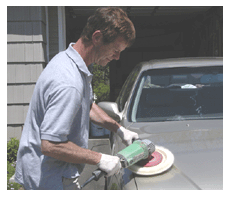Remember the elderly man who made the news a few years ago when he drove down to his local bank to cash in the one million pennies he had collected over
his lifetime?
He walked away with $10,000. The point? Every little bit helps, so maybe it’s time to consider detailing for profit. You could collect an additional $100 to $300 (50 percent to 65 percent net profit) per customer by adding professional detailing to your list of services.

A Natural Fit
Professional detailing is a natural fit for body shops. At the very least, you’re probably already washing the exterior of your customers’ cars. Why not take it one step further and offer engine and undercarriage cleaning, stain removal, shampooing of the interior, etc.? You already have a base of customers whose loyalty and trust you’ve earned – customers ready to bring their business back to you and recommend you to their friends. All your estimator has to do is say, “Mr. Jones, for an extra $250, we can offer you a top-level detailing job and make your car look like it just came off the concourse.”
You also have an established location and established management techniques and personnel policies.
Plus, the pollution controls you’ve implemented and the OSHA requirements you’ve complied with to operate a collision repair shop will give you a head start in setting up a detail operation.
And let’s not forget that you probably already have most of the tools necessary to do professional detailing, save for a few specialized ones. And if you’re already washing cars, you probably have at least one wash bay and may have space to add on an extra one. It’s safe to say most shops will need an investment of at least $3,000 to start, which would include the purchase of a good carpet extractor.
But even if you don’t have all the right tools and space to begin with, don’t rule out adding a detailing business to your shop. The beauty of it is that you don’t have to go all out to start off; you can ease into it and test the water first. Just remember: Do top-quality work from the beginning because that’s where referrals and good word-of-mouth will come from.
Study Your Market
Various car ownership factors today are making car detailing an attractive business to get into. First, the price of new cars continues to rise by an average of $1,000 a year, convincing many car owners that maintaining their car is a wise investment. Second, people are keeping their cars longer, more than 7.5 years compared with 5.5 in 1970, according to Detroit-based research company R.L. Polk.
It’s also worth noting that the traditional suburban ritual of washing and waxing the car on Saturday is declining as American consumers elect to spend their precious leisure time with their families or doing recreational activities. Our society has become one that’s willing to pay a premium for convenience, including having someone else clean their car.
Examine your customer profile to decide if enough of them would be willing to pay for detailing services. If you have fairly upscale clients who have a great deal of disposable income and take pride in their cars’ appearance, then they might not think twice about dropping $100 to $300 on detail service once their cars are fixed.
Geographic location comes into play as well. If your shop is located in the South, you could have detail demand all year-round. In the North, there could be lull periods in winter. Rest assured, though, that wherever you’re located, there will be plenty of competition from fixed-site shops and mobile detailing operations.
Success is in the Details
Watkins Auto Body in Birmingham, Ala., has the type of clients who are willing to pay for a professional detail job. Many drive Lexus, Mercedes-Benz, Porsche or BMW vehicles. The shop, which had always detailed its customers’ cars to an extent, decided to take the next step a few years ago.
“I decided to start charging for it and going further with it, selling the customer an all-over wax, full detail inside, leather balming, etc.,” says manager Jack Helbin. “We were already polishing the car all over from a quality standpoint. We turned a negative into a positive by going from breaking even to making money on it.”
At the time, the shop was already in the process of expanding from two to six bays, so it had the necessary room for ramping up its detail work. Previously, only one detail employee handled color, sand and buff, which the shop considers a separate profit center. He’s a salaried employee who now helps out a new detail person whenever he can. The detail staff also does collision cleanups or detail work on cars that have also been repaired, and those take priority over “detail-only” work. The detail-only work is scheduled on Mondays or Tuesdays since the shop is too busy with collision repair the rest of the week.
“The nice thing is it keeps customers coming back and gives you a chance to inspect previous paint work you did,” Helbin says.
Helbin decided to price the service fairly conservatively at $125 to $150, a lot less than the $300 to $400 area professional detail-only shops were charging. “If I’m doing almost as much as a full-blown detail shop and charging less, it’s a bargain,” he says.
Over the past three months, Helbin says the shop has grossed $3,460 for detail work, of which he says 65 percent is net profit. Part of the reason for the high net profit is a low labor rate – Watkins’ detail men earn $8.50 per hour. At that rate, many shops say it’s hard to keep good guys around, but Helbin takes the approach of hiring techs and starting them in detail, not just pulling guys off the street.
Says Helbin: “We hire kids right out of tech school and tell them, ‘If you want to move up to body prep or paint, this is where you’ll start so we can find out how hard of a worker
you are.’ ”
Even so, Helbin admits that he does experience some turnover in the detail department and, as a result, has even had to work there himself on a few occasions. But he’s says it’s worth it in the end.
“We take in 15 to 16 cars a week, and if we can get seven details out of those, it makes a big difference to the bottom line,” Helbin says.
Dave Martin of Sanford Paint & Body in Sanford, Fla., agrees that detailing contributes positively to his bottom line, although he takes a more casual approach to it.
“Sometimes a customer will ask specifically about a detail, and we’ll charge them an added cost, but other times we just do it complimentary,” Martin says. “We just ask people when they come in and do it that way. The labor isn’t expensive, and it’s profit on top of the repair job, so anything you can see on top of a job is good.”
Martin charges $150 for a detail that includes things like buffing and polishing, detailing the engine bay and cleaning the jambs. He pays one detail man $12 per hour and spends about $200 a month on detailing supplies.
“If you pay a guy $12 an hour and a job takes three hours to do, that’s a pretty good profit,”
Martin says.
Matt Casiano, president of C&D Auto Body in Hackensack, New Jersey, doesn’t look at detailing from a profit angle but more from a marketing one.
“If you do a detail on a larger collision job, the customer’s friends all know he got in an accident, so when they see the car, it will look so good they’ll ask if he actually got a new one,” Casiano says. “Then those friends will ask who detailed it and may call you to detail their own car.”
Typically, Casiano, who employs a full- and part-time detailer, will do a full detail for a first-time customer free of charge to make a good first impression. And if it’s a big enough repair job, he’ll also throw in a full detail for free, whether you’re a new customer or not. For regular customers with average-sized repair jobs, however, the rate is $225. At that rate, he says he makes money on some cars and breaks even on others.
“[Detailing] is an absolute necessity to offer customers,” he says. “Guys who only do professional detailing don’t know how to handle paint and aren’t always using products that are best for the finish. And who understands paint better than a body shop?”
Writer Jason Stahl is editor of BodyShop Business.
|
Tools of the Trade
– Car wash shampoo Source: www.guidetodetailing.com |
|
Detailing Defined
Before even thinking about offering detailing as an add-on service, body shops need to define what it is and spell out to the customer exactly what services that detail will include. Take a word from the wise from Robert Black, owner of Tallmadge Collision Center in Tallmadge, Ohio, who cited customers’ finicky ways as one reason he got out of detailing. “Everyone has their own idea of what detailing is,” Black says. “So we’d do a $10,000 repair job and the customer would pick up the car and be happy, but then we’d do a $99 detail and the customer wasn’t pleased.” The lesson? Understand what detailing encompasses and tell the According to the dictionary, auto detailing is “the practice of performing an extremely thorough cleaning and polishing of an automobile, both inside and out, to produce a show-quality level of detail.” But it’s up for debate as to what services comprise a full detail. Some might argue that if you haven’t used a boar’s hair brush to clean dust and dirt from crevices or used an ozone machine that creates an “ozone fog” inside the car to counteract pet odors or done paint touchups, you haven’t done a complete detail. Others might say that washing the outside and vacuuming and shampooing the interior is enough. Typical services include:
Others:
|













